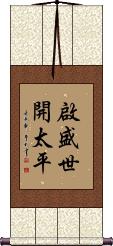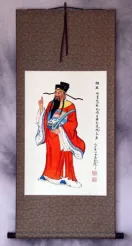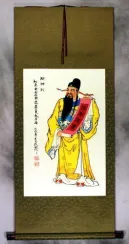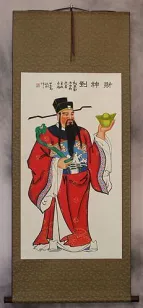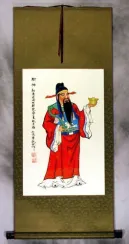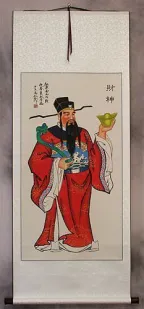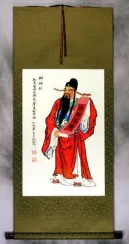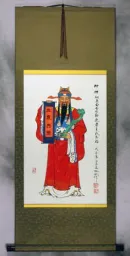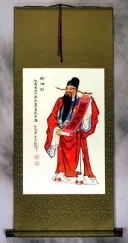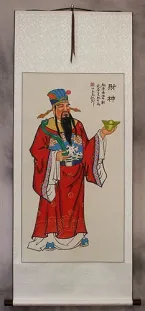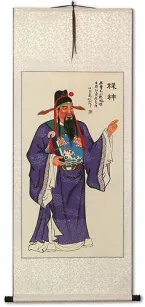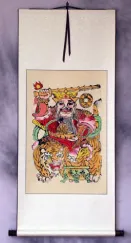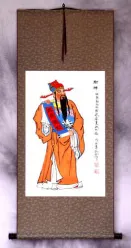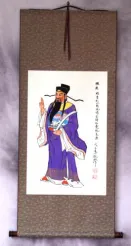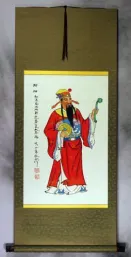Many custom options...
And formats...

Peace and Prosperity in Chinese / Japanese...
Buy a Peace and Prosperity calligraphy wall scroll here!
Personalize your custom “Peace and Prosperity” project by clicking the button next to your favorite “Peace and Prosperity” title below...
Worldwide Wish for Peace and Prosperity
啟盛世開太平 means “To bring flourishing peace and security to the world (our current era).”
It's a wish that a new door leading to peace and prosperity could be opened to mankind.
Character and word breakdown:
啟 to open; to start; to initiate; to enlighten or awaken.
盛世 a flourishing period; period of prosperity; a golden age.
開 to open; to start; to turn on.
太平 peace and security; peace and tranquility; peace; tranquility.
I don't like to do breakdowns like this, as the words altogether create their unique meaning (encompassed in the main title above).
The Whole World at Peace
This proverb can be translated as the whole world at peace, peace and prosperity, peaceful and tranquil, peace reigns over the land, times of peace, peace and tranquillity, peaceful world, or from the Greek, times of halcyon.
Sometimes (rarely) written as 天下泰平 (variant 3rd character).
Safety and Well-Being of the Family
Kanai Anzen
家內安全 is the Japanese way of saying “Family First.”
It's a Japanese proverb about the safety and well-being of your family and/or peace and prosperity in the household.
Some Japanese will hang an amulet in their home with these Kanji. The purpose is to keep your family safe from harm.
According to Shinto followers, hanging this in your home is seen as an invocation to God to always keep family members free from harm.
We were looking for a way to say “family first” in Japanese when this proverb came up in the conversation and research. While it doesn't say “family first,” it shows that the safety and well-being of your family is your first or most important priority. So, this proverb is the most natural way to express the idea that you put your family first.
This in-stock artwork might be what you are looking for, and ships right away...
Good Fortune / Prosperity Saint Wall Scroll
Discounted Blemished
Gallery Price: $71.00
Your Price: $39.00
Lu Xing
God Of Money & Prosperity
Wall Scroll
Discounted Blemished
Gallery Price: $71.00
Your Price: $39.00
Gallery Price: $108.00
Your Price: $59.88
Gallery Price: $108.00
Your Price: $59.88
Gallery Price: $120.00
Your Price: $59.88
Not the results for peace and prosperity that you were looking for?
Below are some entries from our dictionary that may match your peace and prosperity search...
| Characters If shown, 2nd row is Simp. Chinese |
Pronunciation Romanization |
Simple Dictionary Definition |
天下太平 see styles |
tiān xià tài píng tian1 xia4 tai4 ping2 t`ien hsia t`ai p`ing tien hsia tai ping tenkataihei / tenkataihe てんかたいへい |
More info & calligraphy: The Whole World at Peace(expression) (yoji) peaceful and tranquil (uneventful); peace reigns over the land; halcyon times of peace |
家内安全 see styles |
kanaianzen かないあんぜん |
More info & calligraphy: Safety and Well-Being of the Family |
小康 see styles |
xiǎo kāng xiao3 kang1 hsiao k`ang hsiao kang shoukou / shoko しょうこう |
moderately affluent; well-off; a period of peace and prosperity (1) lull; breathing spell; respite; (2) remission (of an illness); becoming stable |
康平 see styles |
kāng píng kang1 ping2 k`ang p`ing kang ping kouhei / kohe こうへい |
peace and prosperity Kōhei era (1058.8.29-1065.8.2); (given name) Yasuhei |
承平 see styles |
chéng píng cheng2 ping2 ch`eng p`ing cheng ping jouhei / johe じょうへい |
(successive periods of) peace and prosperity; peaceful Jōhei era (931.4.26-938.5.22); Shōhei era; (given name) Jōhei |
桃花源 see styles |
táo huā yuán tao2 hua1 yuan2 t`ao hua yüan tao hua yüan |
the Peach Blossom Spring, a hidden land of peace and prosperity; utopia |
光天化日 see styles |
guāng tiān huà rì guang1 tian1 hua4 ri4 kuang t`ien hua jih kuang tien hua jih |
the full light of day (idiom); fig. peace and prosperity; in broad daylight |
光風霽月 光风霁月 see styles |
guāng fēng jì yuè guang1 feng1 ji4 yue4 kuang feng chi yüeh koufuuseigetsu / kofusegetsu こうふうせいげつ |
lit. light breeze and clear moon (idiom); period of peace and prosperity; noble and benevolent character (noun - becomes adjective with の) (yoji) serenity |
國泰民安 国泰民安 see styles |
guó tài mín ān guo2 tai4 min2 an1 kuo t`ai min an kuo tai min an |
the country prospers, the people at peace (idiom); peace and prosperity |
太平盛世 see styles |
tài píng shèng shì tai4 ping2 sheng4 shi4 t`ai p`ing sheng shih tai ping sheng shih |
peace and prosperity (idiom) |
歌舞升平 see styles |
gē wǔ shēng píng ge1 wu3 sheng1 ping2 ko wu sheng p`ing ko wu sheng ping |
lit. to celebrate peace with songs and dance (idiom); fig. to make a show of happiness and prosperity |
歌舞昇平 歌舞升平 see styles |
gē wǔ shēng píng ge1 wu3 sheng1 ping2 ko wu sheng p`ing ko wu sheng ping |
lit. to celebrate peace with songs and dance (idiom); fig. to make a show of happiness and prosperity |
The following table may be helpful for those studying Chinese or Japanese...
| Title | Characters | Romaji (Romanized Japanese) | Various forms of Romanized Chinese | |
| Worldwide Wish for Peace and Prosperity | 啟盛世開太平 启盛世开太平 | qǐ shèng shì kāi tài píng qi3 sheng4 shi4 kai1 tai4 ping2 qi sheng shi kai tai ping qishengshikaitaiping | ch`i sheng shih k`ai t`ai p`ing chishengshihkaitaiping chi sheng shih kai tai ping |
|
| The Whole World at Peace | 天下太平 | tenkataihei tenkataihei | tiān xià tài píng tian1 xia4 tai4 ping2 tian xia tai ping tianxiataiping | t`ien hsia t`ai p`ing tienhsiataiping tien hsia tai ping |
| Safety and Well-Being of the Family | 家內安全 家内安全 | ka nai an zen kanaianzen | ||
| In some entries above you will see that characters have different versions above and below a line. In these cases, the characters above the line are Traditional Chinese, while the ones below are Simplified Chinese. | ||||
Successful Chinese Character and Japanese Kanji calligraphy searches within the last few hours...
